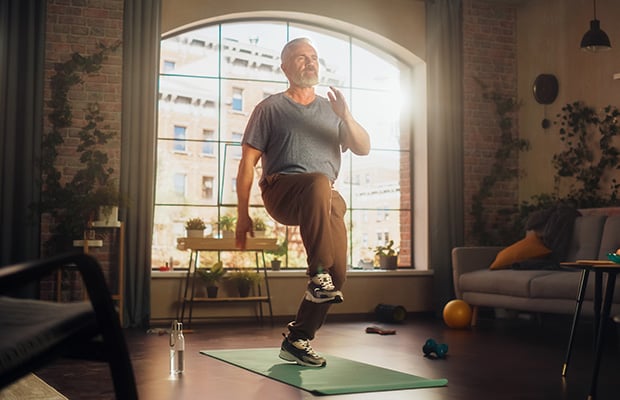Adding some exercise to your daily routine can help you feel better. Our Senior Cardiac Nurse, Philippa Hobson, explains how to exercise safely if you have angina.
If you suffer from angina, you may be concerned that exercise will make your symptoms worse. The truth is, exercise is perfectly safe if it's done in the right way, and many patients find that exercise helps them feel better.
Regular exercise improves your body’s ability to take in and use oxygen, which means you can do daily activities more easily and feel less tired. It can also help reduce your angina symptoms (like chest pain and shortness of breath) by encouraging your body to use a network of tiny blood vessels that supply your heart.
Exercise can also reduce the risk of your angina getting worse, and of a heart attack or stroke, as well as helping to manage your weight and reduce your risk of back pain.
What type of exercise should I do?
Aerobic exercises will provide the most benefits because they make your heart beat faster and you breathe more quickly. You could try walking, cycling or a living room workout at a level that suits you.
Look for exercise that you enjoy and that’s easy to fit into your life. Put it in your diary or ask a friend or family member to join you. Exercising with someone else can motivate you, whether it’s in person, by phone as you both go for a walk or an online exercise class.
How to exercise safely when you have angina
- Warm up by starting slowly for a few minutes. This allows the blood vessels to start widening, so you’re less likely to get angina symptoms.
- At the end, gradually slow down for 10 minutes until your breathing and heart rate return to normal.
- Start with short, gentle sessions if it’s a new exercise, or you haven’t done it for a long time. It’s normal to get a bit out of breath, but don’t push yourself so much that you can’t talk.
- If you’re advised to, take your GTN spray before you exercise and carry it along with you. It only lasts about 30 minutes, so ask your doctor about nitrate tablets if you need something longer lasting.
- Don't exercise when you’re getting angina symptoms, or if you have symptoms at rest.
- Check with your GP or nurse before starting something new.
Read more about angina.
Back to top ^








